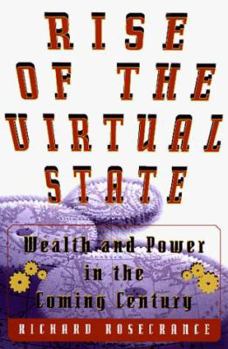The Rise Of The Virtual State
Select Format
Select Condition 
Book Overview
What will power look like in the century to come? "Imperial Great Britain may have been the model for the nineteenth century," Richard Rosecrance writes, "but Hong Kong will be the model for the... This description may be from another edition of this product.
Format:Hardcover
Language:English
ISBN:0465071414
ISBN13:9780465071418
Release Date:October 1999
Publisher:Basic Books
Length:304 Pages
Weight:1.25 lbs.
Dimensions:10.0" x 1.0" x 6.5"
Customer Reviews
3 ratings
State-Power and the Transformation of Geopolitics
Published by Thriftbooks.com User , 17 years ago
The end of the Cold War generated a major change in the popularity of classical geopolitics among scholars and policy makers as well as a shift to the study of globalization as the dominant feature of today's international relations. The 1990s was an outstanding platform for the revision and criticism of classical realism and the emergence of several alternative theories that focused on the changing nature of the state. As a result, the production of literature focusing of the effects of globalization upon the 21st century state is massive. The mainstream approach questions the relevance of state-centrism and territoriality as dominant features of contemporary international relations and believes that globalization makes interstate conflict highly unlikely. Lawrence E. Modisett, from the Naval War College, refers to these scholars as "post-nation-state optimists" in contrast to "post-nations-state pessimists" such as Samuel Huntington and Kenneth Waltz. The suggestion that increasing commercial interaction between nations leads to peace, is not a new idea. Montesquieu believed that peace is the natural effect of trade. Similarly, Francis Fukuyama on his influential article --later expanded into a book-- argued that "the end of history" had arrived with the global triumph of liberal democracy. Most recently, journalists such as Thomas Friedman argue that mutual commercial interest raises the opportunity cost of war among trading partners. Along the same line of thought, The Rise of the Virtual State: Wealth and Power in the Coming Century, by Richard Rosecrance2 is one of the most systematic attempts to explain the changing nature of state, trade, conflict and international relations from a post-nation-state optimism. He argues that in the new century, military conquest of territory will make little sense. Rosecrance "fundamentally optimistic" theory (p.24) is based on the idea that opportunity cost of invasion will be much higher than the dividends of seizing territory: "War has retained a place in international history because it enables one country to seize resources from another. If some nations did not believe the benefits of war exceed the costs, war would seldom occur. Invasions are a threat to a country because it takes away land, a valuable asset." (p. 200). However, in a situation which seems analogous to the immediate years following the Second World War, the events that took place in New Work, Washington and Pennsylvania in September 11 of 2001, as well as the invasion of Iraq by President George W. Bush have raised several question marks on optimistic theories of international relations. In addition, China's impressive sustainable growth has raised diverse questions of whether the emergence of a new world power will be a peaceful one. Therefore, is not unreasonable to presume that some of the theories inspired by the classical realists such as of Alfred T. Mahan, Halford J. Mackinder, Karl Haushofer and George F. Kennan, among othe
Good but lacking empirical research
Published by Thriftbooks.com User , 24 years ago
This book has been written from what the scholars of International Relations would call "Pluralist - Liberalist" perspective. The argument in the book about the "head" and "body" nations is convincing but it is not adequate to fail to acknowledge the realist interpretation. It is easy to see that it is too early to predict that the trade relations between states will undermine the security interests as the states perceive them. And a big negative for the book is the lack of empirical research.
very thought provoking
Published by Thriftbooks.com User , 24 years ago
This book brought me to the recognition of a number of features current in our society and business world, and helped me to put a number of puzzling events in perspective. Just the idea that land is now less important in the economic world itself is an important revelation. I think everyone in the investment community, as well as the academic area of the author, should read this book.






